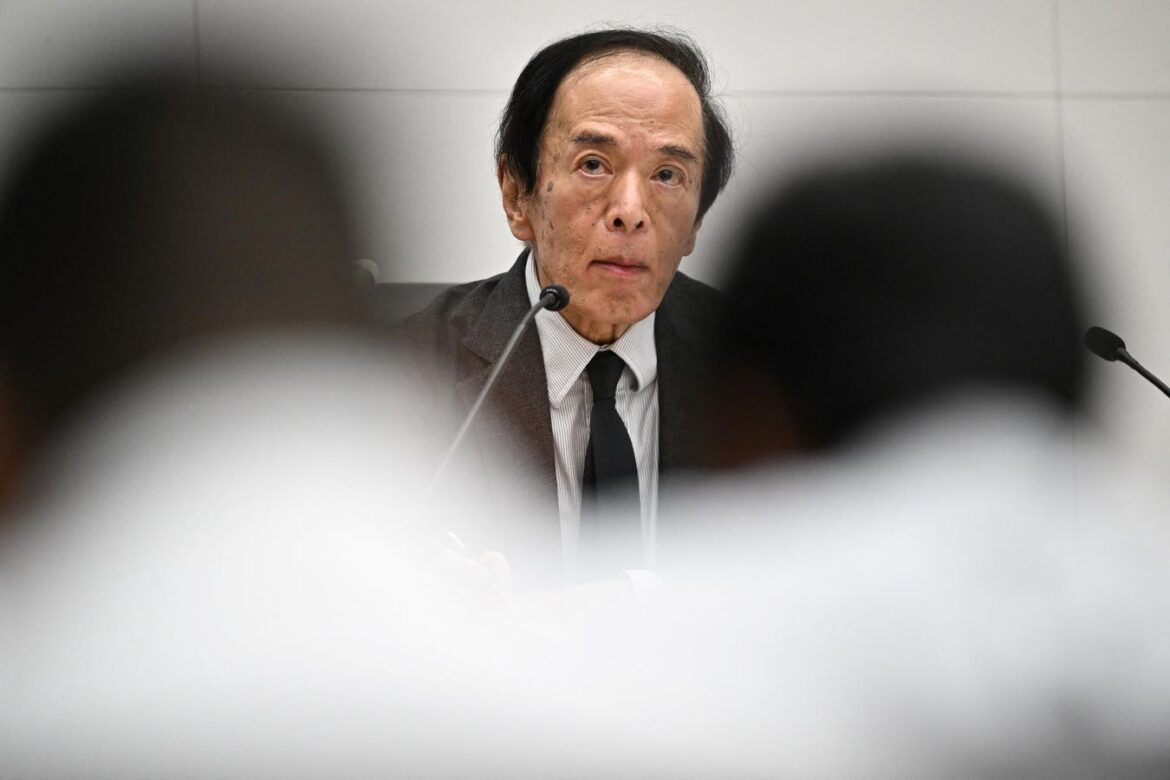Bank of Japan (BoJ) governor Kazuo Ueda.
PHILIP FONG/AFP via Getty Images
As Donald Trump juggles two big battles — one foreign, one domestic — the Bank of Japan finds itself even further in uncharted territory.
Where the conflict in the Middle East goes post-U.S. attacks on Iranian nuclear sites is anyone’s guess. Exhibit A is how oil traders can’t decide if the “ceasefire” President Trump will hold or if fresh hostilities are about to flare up.
The BOJ, it follows, faces an even tougher decision at its late-July policy meeting, not knowing if Brent crude is heading to $100 or $60 per barrel.
But Trump’s domestic battle against the Federal Reserve could challenge BOJ Governor Kazuo Ueda’s team in Tokyo just as much. Trump’s rhetorical bombing raids against Fed Chair Jerome Powell could backfire spectacularly on Asia.
One obvious transmission channel is the dollar. The more Trump World attacks the Fed’s independence, the more Powell’s team has a credibility problem. Any loss of faith in the reserve currency could send shockwaves Asia’s way. For all this region’s efforts to wean itself off exports for growth, it’s still as dollarized as any.
Trump’s threats to fire Powell unnerved Asia significantly. And to intimidate him by calling him a “numbskull” among other schoolyard-bully tactics. On Wednesday, the Wall Street Journal reported that Trump is considering nominating a replacement long before Powell’s term is up in May 2026.
A sliding dollar would also put at risk more than $2.5 trillion of Asian savings sitting in U.S. Treasury securities. Japan has the most, with $1.1 trillion worth, and China is second with $760 billion.
Another channel: surging U.S yields would cause chaos in Asian credit markets. The mini-crash in the U.S. government debt market in April and May, caused by fallout from Trump’s tariffs, shocked Tokyo markets.
In mid-May, a routine auction of 20-year Japanese government bonds flopped spectacularly. The sale of $6.9 billion of JGBs maturing in 2045 attracted the weakest demand since 2012. The “tail,” the spread between the average and lowest-accepted price, was the ugliest since 1987. Tokyo’s auction of 40-year bonds later that month didn’t fare much better.
It hardly helped that Prime Minister Shigeru Ishiba said in May that Japan’s deteriorating finances are “worse than Greece.” Talk about putting Japan in global headlines for all the wrong reasons.
Ishiba was making a more nuanced point than that. His argument was aimed at lawmakers planning to cut taxes. Ishiba framed it as a luxury Japan couldn’t afford, given its lack of fiscal space. Yet his gaffe went viral in market circles — in the worst possible ways. No doubt it raised the antennae of credit-rating companies everywhere.
For Ueda’s team at the BOJ, these risks make next month’s already near-impossible rate call even harder. In May, Japan’s key inflation measure hit a fresh two-year high, rising 3.7% year on year. That’s nearly double the BOJ’s 2% price target. It’s also the worst inflation record among Group of Seven nations.
Japan, meanwhile, is very likely in recession. The 0.2% contraction in the first quarter predated the worst of Trump’s tariffs. The April-June period is almost certain to see an even deeper GDP contraction.
This created quite a dilemma for the BOJ. Does it push on with its tightening cycle to cap inflation, though at the risk of doing deeper economic damage? Or does the BOJ stand pat and risk letting inflation become even more ingrained?
It really is debatable which policymaker has the worst job in global economics — Ueda or Powell. Luckily for Ueda, Japan’s political establishment doesn’t have its knives out for the BOJ like Trump does for the Fed.
That could change quickly, though, if politicians start blaming Ueda for Japan’s lackluster trajectory. The ruling Liberal Democratic Party, which has run Japan with just two brief gaps since 1955, is very skilled at pinning economic slowdowns on the BOJ. The fact Ishiba’s LDP faces an election on July 20 only heightens the BOJ’s worries about the political establishment striking back.
The real threats, though, come from how Trump handles the two biggest battles thus far in his second presidency. How either one progresses is anyone’s guess, including BOJ officials struggling to game things out.


AloJapan.com